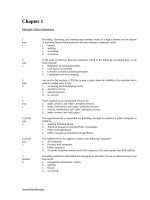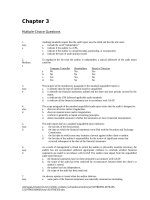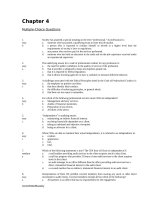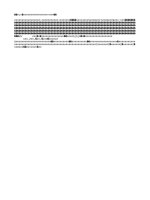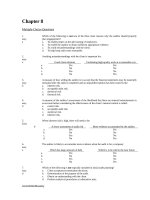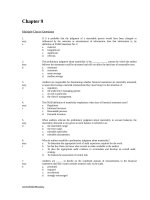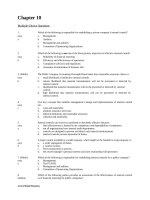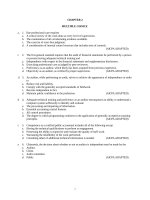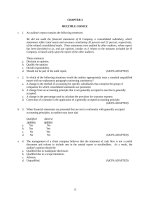Test bank auditing and assurance principles 5e by richiutte ch3
Bạn đang xem bản rút gọn của tài liệu. Xem và tải ngay bản đầy đủ của tài liệu tại đây (104.28 KB, 10 trang )
CHAPTER 3
MULTIPLE CHOICE
c
1. An auditor's report contains the following sentences:
We did not audit the financial statements of B Company, a consolidated subsidiary, which
statements reflect total assets and revenues constituting 20 percent and 22 percent, respectively,
of the related consolidated totals. These statements were audited by other auditors, whose report
has been furnished to us, and our opinion, insofar as it relates to the amounts included for B
Company, is based solely upon the report of the other auditors.
a.
b.
c.
d.
These sentences
Disclaim an opinion.
Qualify the opinion.
Divide responsibility.
Should not be part of the audit report.
(AICPA ADAPTED)
c
2. In which of the following situations would the auditor appropriately issue a standard unqualified
report with no explanatory paragraph concerning consistency?
a. A change in the method of accounting for specific subsidiaries that comprise the group of
companies for which consolidated statements are presented.
b. A change from an accounting principle that is not generally accepted to one that is generally
accepted.
c. A change in the percentage used to calculate the provision for warranty expense.
d. Correction of a mistake in the application of a generally accepted accounting principle.
(AICPA ADAPTED)
b
3. When financial statements are presented that are not in conformity with generally accepted
accounting principles, an auditor may issue a(n)
a.
b.
c.
d.
a
Qualified
opinion
Yes
Yes
No
No
Adverse
opinion
No
Yes
Yes
No
(AICPA ADAPTED)
4. The management of a client company believes that the statement of cash flow is not a useful
document and refuses to include one in the annual report to stockholders. As a result, the
auditor's opinion should be
a. Qualified due to inadequate disclosure.
b. Qualified due to a scope limitation.
c. Adverse.
d. Unqualified.
(AICPA ADAPTED)
15
d
5.
a.
b.
c.
d.
An auditor would issue an adverse opinion if
The audit was begun by other independent auditors who withdrew from the engagement.
A qualified opinion cannot be given because the auditor lacks independence.
The restriction on the scope of the audit was significant.
The statements taken as a whole do not fairly present the financial position, results of operations,
and cash flows of the company.
(AICPA ADAPTED)
d
6. The fourth reporting standard requires that the auditor's report contain either an expression of
opinion regarding the financial statements taken as a whole or an assertion that an opinion cannot
be expressed. The objective of the fourth standard is to prevent
a. An auditor from reporting on one basic financial statement and not the others.
b. An auditor from expressing different opinions on each of the basic financial statements.
c. Management from reducing its responsibility for the basic financial statements.
d. Misinterpretations about the degree of responsibility the auditor assumes.
(AICPA ADAPTED)
d
7. An auditor's opinion reads as follows: "In our opinion, except for the above-mentioned limitation
on the scope of our audit...” This is an example of a(n)
a. Review opinion.
b. Emphasis on a matter.
c. Qualified opinion.
d. Unacceptable reporting practice.
(AICPA ADAPTED)
c
8. An auditor's report includes a statement that "the financial statements do not present fairly the
financial position in conformity with generally accepted accounting principles." This auditor's
report was probably issued in connection with financial statements that were
a. Prepared on a comprehensive basis for accounting other than GAAP.
b. Restricted for use by management.
c. Misleading.
d. Condensed.
(AICPA ADAPTED)
c
9. If the auditor believes there is minimal likelihood that resolution of an uncertainty will have a
material effect on the financial statements, the auditor would issue a(n)
a. Qualified opinion.
b. Adverse opinion.
c. Unqualified opinion.
d. Disclaimer of opinion.
(AICPA ADAPTED)
b
10. If an accounting change has no material effect on the financial statements in the current year but
the change is reasonably certain to have a material effect in later years, the change should be
a. Treated as a consistency modification in the auditor's report for the current year.
b. Disclosed in the notes to the financial statements of the current year.
c. Disclosed in the notes to the financial statements and referred to in the auditor's report for the
current year.
d. Treated as a subsequent event.
(AICPA ADAPTED)
16
c
11. When comparative financial statements are presented, the fourth reporting standard, which refers
to financial statements "taken as a whole," should be considered to apply to the financial
statement of the
a. Periods presented plus one preceding period.
b. Current period only.
c. Current period and those of the other periods presented.
d. Current and immediately preceding period only.
(AICPA ADAPTED)
b
12. An auditor's standard report expresses an unqualified opinion and includes an explanatory
paragraph that emphasizes a matter included in the notes to the financial statements. The
auditor's report would be deficient if the explanatory paragraph states that the entity
a. Is a component of a larger business enterprise.
b. Has changed from the completed contract method to the percentage of completion method to
account for long-term construction contracts.
c. Has had a significant subsequent event.
d. Has accounting reclassifications that enhance the comparability between years.
(AICPA ADAPTED)
d
13. Raider, Inc., uses the last-in, first-out method to value half of its inventory and the first-in, firstout method to value the other half. Assuming the auditor is satisfied in all other respects, under
these circumstances the auditor will issue a(n)
a. Opinion modified due to inconsistency.
b. Unqualified opinion with an explanatory middle paragraph.
c. Qualified or adverse opinion, depending on materiality.
d. Unqualified opinion.
(AICPA ADAPTED)
d
14. Under which of the following sets of circumstances might an auditor disclaim an opinion?
a. The financial statements contain a departure from GAAP, the effect of which is material.
b. The principal auditor decides to make reference to the report of another auditor who audited a
subsidiary.
c. There has been a material change between periods in the method of the application of accounting
principles.
d. There were significant limitations on the scope of the audit.
a
15. An auditor includes an explanatory paragraph in an otherwise unqualified report in order to
emphasize that the entity being reported on is a subsidiary of another business enterprise. The
inclusion of this paragraph
a. Is appropriate and would not negate the unqualified opinion.
b. Is a qualification.
c. Is a violation of generally accepted reporting standards if this information is disclosed in
footnotes to the financial statements.
d. Necessitates a revision of the opinion paragraph to include the phrase "with the foregoing
explanation."
17
c
16.
a.
b.
c.
In which of the following circumstances would an adverse opinion be appropriate?
The auditor is not independent with respect to the enterprise being audited.
An uncertainty prevents the issuance of an unqualified report.
The statements are not in conformity with authoritative statements regarding accounting for
pension plans.
d. A client-imposed scope limitation prevents the auditor from complying with generally accepted
auditing standards.
b
17.
a.
b.
c.
d.
d
18. An auditor completed fieldwork on February 10, 2005 for a December 31, 2004 year-end client.
A significant subsequent event occurred on February 22, 2005. In this case, which of the
following report dates would not be appropriate?
a. February 10, 2005.
b. February 10, except Note 1, February 22, 2005.
c. February 22, 2005.
d. December 31, 2004.
d
19. Which of the following statements indicates a qualified opinion?
a. The financial statements do not present fairly in all material respects the financial position, results
of operations, and cash flows in conformity with GAAP.
b. The auditor does not express an opinion on the financial statements.
c. The financial statements present fairly in all material respects the financial position, results of
operations, and cash flows in conformity with GAAP.
d. Except for the effects of a matter, the financial statements present fairly in all material respects
the financial position, results of operations, and cash flows in conformity with GAAP.
b
20. Under Statement on Auditing Standards No. 59, "The Auditor's Consideration of an Entity's
Ability to Continue as a Going Concern," an independent auditor is responsible to
a. Predict whether the entity will be in business one year from the balance sheet date.
b. Evaluate whether there is substantial doubt about the entity's ability to continue as a going
concern.
c. Weigh mitigating factors against contrary information about the entity's ability to continue as a
going concern.
d. Report the entity's ability to continue as a going concern to senior management and to the board
of directors.
c
21. Does an auditor make the following representations explicitly or implicitly in a standard audit
report on comparative financial statements?
a.
b.
c.
d.
An audit report should be dated as of
the date the report is delivered to the entity audited.
the date of the last day of fieldwork.
the balance sheet date of the latest period reported on.
the date a letter of audit inquiry is received from the entity's attorney of record.
Consistent application
of accounting principles
Explicitly
Implicitly
Implicitly
Explicitly
Examination of
evidence on a test basis
Explicitly
Implicitly
Explicitly
Implicitly
18
(AICPA ADAPTED)
a
22. An auditor is unable to determine the amounts associated with illegal acts committed by a client.
The auditor would most likely
a. Issue either a qualified opinion or a disclaimer of opinion.
b. Issue an adverse opinion.
c. Issue either a qualified opinion or an adverse opinion.
d. Issue a disclaimer of opinion.
(AICPA ADAPTED)
b
23. A principal auditor is satisfied both with the independence and professional reputation of another
auditor who audited a subsidiary, but wants to share responsibility with the other auditor in the
audit report. The principal auditor should
a. Modify the scope and opinion paragraphs of the report.
b. Modify the introductory and opinion paragraphs of the report.
c. Not modify the report except for including an explanatory paragraph.
d. Modify the opinion paragraph of the report.
(AICPA ADAPTED)
a
24. An auditor may issue a qualified opinion for
a.
b.
c.
d.
a
Inadequate
Disclosure
Yes
Yes
No
No
Scope
Limitation
Yes
No
Yes
No
(AICPA ADAPTED)
25. An explanatory paragraph following an opinion paragraph describes an uncertainty as follows:
As discussed in Note X to the financial statements, the company is a defendant in a lawsuit
alleging infringement of certain patent rights and claiming damages. Discovery proceedings
are in progress. The ultimate outcome of the litigation cannot presently be determined.
Accordingly, no provision for any liability that may result upon adjudication has been made in
the accompanying financial statements.
a.
b.
c.
d.
d
What type of opinion should the auditor express in this circumstance?
Unqualified.
Qualified.
Disclaimer.
Adverse.
(AICPA ADAPTED)
26. An auditor's report that refers to a departure from generally accepted accounting principles
includes the language, “In our opinion, with the foregoing explanation, the financial statements
referred to above present fairly ...” This is a/an
a. Adverse opinion.
b. Qualified opinion.
c. Unqualified opinion with an explanatory paragraph.
d. Example of inappropriate reporting.
(AICPA ADAPTED)
19
b
27. When management prepares financial statements on the basis of a going concern and the auditor
believes the company may not continue as a going concern, the auditor should issue
a. A qualified opinion.
b. An unqualified opinion with an explanatory paragraph.
c. A disclaimer of opinion.
d. An adverse opinion.
(AICPA ADAPTED)
b
28. An auditor concludes that there is substantial doubt about an entity's ability to continue as a going
concern. If the entity's disclosures about continued existence are adequate, the audit report may
include
a.
b.
c.
d.
A disclaimer of opinion
Yes
Yes
No
No
No
Yes
Yes
No
A qualified opinion
(AICPA ADAPTED)
a
29. Keller, CPA, was about to issue an unqualified opinion on the financial statements of Lupton
Television Broadcasting Company when a letter was received from Lupton's independent counsel.
The letter stated that the Federal Communications Commission has notified Lupton that its
broadcasting license will not be renewed because of alleged irregularities in its broadcasting
practices. Lupton cannot continue to operate without the license. Keller has also learned that
Lupton and its independent counsel plan to take all necessary legal action to retain the license.
The letter from independent counsel, however, states that a favorable outcome of any legal action
is highly uncertain. On the basis of this information, what action should Keller take?
a. Issue an unqualified opinion, with an explanatory paragraph that describes the matter--giving rise
to the uncertainty.
b. Issue an unqualified opinion if full disclosure is made of the matter in a note to the financial
statements.
c. Issue an adverse opinion and disclose all reasons why.
d. Issue a piecemeal opinion with full disclosure made of the license dispute in a note to the
financial statements.
(AICPA ADAPTED)
d
30. If the auditor believes that required disclosures are omitted from the financial statements, the
auditor should decide between issuing
a. A qualified opinion or an adverse opinion.
b. A disclaimer of opinion or a qualified opinion.
c. An adverse opinion or a disclaimer of opinion.
d. An unqualified opinion or a qualified opinion.
(AICPA ADAPTED)
b
31.
a.
b.
c.
d.
An auditor's report on comparative financial statements should be dated as of the date the
Report is issued.
Auditor's fieldwork is completed.
Fiscal year ends.
Last subsequent event occurred.
(AICPA ADAPTED)
20
b
32. An auditor is confronted with an exception sufficiently material to warrant departing from the
standard wording of an unqualified report. If the exception relates to a departure from generally
accepted accounting principles, the auditor must decide between
a. An adverse opinion and an unqualified opinion.
b. An adverse opinion and a qualified opinion.
c. An adverse opinion and a disclaimer of opinion.
d. A disclaimer of opinion and a qualified opinion.
(AICPA ADAPTED)
a
33. An auditor had expressed a qualified opinion on the financial statements of a prior period because
the client's financial statements departed from generally accepted accounting principles. The prior
period statements are restated in the current period to conform with generally accepted
accounting principles. The auditor's updated report on the prior period statements should
a. Express an unqualified opinion about the restated financial statements.
b. Be accompanied by the auditor's original report on the prior period.
c. Bear the same date as the auditor's original report on the prior period.
d. Qualify the opinion concerning the restated financial statements because of a change in
accounting principles.
(AICPA ADAPTED)
SHORT ANSWER
1. When would an auditor issue an adverse opinion?
Answer:
Adverse opinions are issued when financial statements depart from GAAP, or when management
is unable to justify an accounting change (and the effect of the departure or change is so highly
material that a qualified opinion is unwarranted.)
2. When the client limits the scope of an audit engagement and the auditor believes this limitation of
scope to be material in nature, what is the action to be taken by the auditor?
Answer:
The auditor must issue a disclaimer of opinion, as the auditor does not have sufficient evidence to
reach an opinion.
3. When an opinion is based upon the work of separate auditors, as is the case with subsidiary
companies, in compiling the work of both audits and expressing an opinion on the combined
statements, how is the principle auditor determined?
Answer:
AU Sec. 543 requires that the following factors be considered:
The materiality of the financial statements audited by each auditor,
The extent of each auditor's knowledge of the overall financial statements, and
The significance of the financial statements audited in relation to the combined entity
taken as a whole.
4. What type of audit opinion would be issued to reflect a material departure from GAAP? Also
explain the modifications needed to be made to the audit report.
21
Answer:
A qualified opinion is required unless the auditor can demonstrate that owing to rare and unusual
circumstances, complying with the pronouncement would cause the financial statements to be
misleading. A qualified opinion for a material departure from GAAP requires an explanatory
paragraph to disclose the misstatement and a modified opinion paragraph.
PROBLEMS
1. As the independent auditor for Jansin Company, you completed the audit engagement for the year
ended August 31, 2005 on October 1, 2005. Jansin Company’s audit revealed no irregularities in
the accounting system and you have concluded that management’s financial statements are
presented fairly in all material respects in conformity with GAAP.
Required:
Produce an audit report for this client addressed to the Board of Directors and company
shareholders.
Answer:
Independent Auditor’s Report
To the Board of Directors and Shareholders of The Jansin Company
We have audited the accompanying balance sheets of the Jansin Company as of August 31, 2005
and the related statements of earnings, retained earnings, and cash flows for the period ended
August 31, 2005. These financial statements are the responsibility of the companies’
management. Our responsibility is to express an opinion on these financial statements based on
our audit.
We conducted our audit in accordance with U.S. generally accepted auditing standards. Those
standards require that we plan and perform the audit to obtain reasonable assurance about whether
the financial statements are free of material misstatement. An audit includes examining, on a test
basis, evidence supporting the amounts and disclosures in the financial statements. An audit also
includes assessing the accounting principles used and significant estimates made by management,
as well as evaluating the overall financial statement presentation. We believe that our audits
provide a reasonable basis for our opinion.
In our opinion, the financial statements referred to above present fairly, in all material respects,
the financial position of the company at August 31, 2005, and the results of operations and cash
flows for the period ended August 31, 2005, in conformity with U.S. generally accepted
accounting principles.
Student’s Company Name
October 1, 2005
2. Based upon information given determine for each of the ten companies:
a. Which type of audit report will be issued
b. Which (in any) paragraphs of the audit report would require modification
c. Would a explanatory paragraph by deemed necessary
22
Company
Circumstance
Company A
Company B
Departure from GAAP
Lack of Independence
Company C
Company D
Company E
Company F
Scope Limitation
Opinion based partly on another auditor’s
work
Going Concern
Emphasize a Matter
Company G
Departure from GAAP
Company H
Going Concern
Company I
Opinion based partly on another auditor’s
work
Inconsistency that management can
justify
Company J
Level of
Materiality
Material
Highly
Material
Material
Material
Material
Highly
Material
Highly
Material
Highly
Material
Highly
Material
Material
Answer:
Company
(a) Form of Audit
Report
(b) Paragraph(s)
Modified
Company A
Company B
Qualified
Disclaimer
Company C
Qualified
Company D
Company E
Company F
Company G
Company H
Company I
Company J
Unqualified
Unqualified
Unqualified
Adverse
Unqualified
Unqualified
Unqualified
Opinion
Omit Introductory,
Scope,
Opinion
Scope/
Opinion
Introductory/Opinion
N/A
N/A
Opinion
N/A
Introductory/Opinion
N/A
23
(c)
Explanatory
Paragraph
Necessary
Yes
Yes
Yes
No
Yes
Yes
Yes
Yes
Yes
Yes
24
